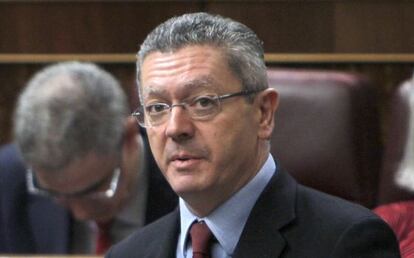Minister hints new abortion law will treat “disability” and “deformity” differently
“I do not think that disability takes away rights from a person,” says justice chief Gallardón

Justice Minister Alberto Ruiz-Gallardón said on Monday that the detection of “disability” in a fetus will “never” be permitted as a reason for requesting an abortion under Spanish law. “I am not someone who thinks that a disability takes rights away from a person, neither before nor after they are born,” he told journalists after speaking at a conference in Madrid, news agency Efe reported.
Gallardón is behind new legislation that has already been approved by the Spanish Cabinet, and will take the country’s laws on terminations back closer to a bill passed in 1985, which restricted abortion on demand to cases of rape, fetal abnormality and when there was a risk to the mother’s health. The Socialist government of Prime Minister José Luis Rodríguez Zapatero brought in a new law in 2010, which switched to a system of abortion-on-demand in the first trimester, in line with many other European countries.
Justice Ministry sources say they are working on the definitions in the section covering deformities
The Cabinet approved Gallardón’s plan to remove fetal deformation as a legal reason to request a termination, but the widespread unpopularity of that idea – even within the ranks of his own Popular Party – has led to recent suggestions that this stance may be softened.
The bill that will be presented to Congress is expected to be finalized in the coming weeks – but as was clear from what Gallardón said on Monday, the details of the issue of fetal deformities are yet to be defined.
The minister’s comments came after he was asked specifically about Down syndrome as a reason for abortion, and his response suggested that the draft law would distinguish between the kind of conditions that will permit expectant mothers to request a termination. Sources from the Justice Ministry have confirmed that it is working on the definitions in the section covering deformities, but would not be drawn on further detail.
The draft law, which was given the go-ahead by the Cabinet last December, did not expressly include fetal deformity among the permitted reasons for requesting an abortion, but rather required pregnant women to produce a report from two psychiatrists stating that going through with such a pregnancy would cause them grave psychological harm. In light of opposition to this condition, sources from the ministry recently announced that it would remove the requirement of having to prove psychological harm via psychiatrists’ reports.
Disability will never determine which citizens are first class and which are second” Justice Minister Gallardón
The Spanish daily La Razón, however, ran a story on Monday saying that under the law, fetal deformity would not include Down syndrome. Asked specifically about this, Gallardón responded: “No one can have fewer rights simply because they have fewer abilities. Of course the system that we will regulate will never include disability,” he said. “Never, as has sadly been the case in other times in Spain, will disability determine which citizens are first class and which are second, neither before they are born nor after.”
The condition of fetal abnormality – which has existed in Spain for 30 years, and was backed by a Constitutional Court ruling – has included Down syndrome until now. The law that was in place until 2010 referred to “serious physical or mental defects,” without going into specifics. In both that law and that of the Socialists, Down syndrome was included; the term “disability” was never used.
EL PAÍS asked the Justice Ministry if it had a list of fetal “disabilities” and whether it considered Down syndrome to be a disability or a fetal anomaly. The response, via a spokesperson, was that: “The ministry is still finishing a definitive project and will take into account what scientific sources say on questions that affect the nasciturus.”
Monday was not the first time that the Justice Minister had made the distinction between “disabilities” and “serious deformities.” A year ago, during an appearance in the Senate and when the draft law was yet to be approved, Gallardón suggested that serious deformities would be a legal reason to request an abortion, while “disabilities,” which he failed to define, would not. But that came to nothing, given that the draft legislation approved by the Cabinet excluded any type of deformity, whether it was serious or otherwise, as a legal basis for an abortion request. Gallardón has since returned to this distinction, without clarifying the criteria that will be used to establish what constitutes a deformity and what constitutes a disability.
Tu suscripción se está usando en otro dispositivo
¿Quieres añadir otro usuario a tu suscripción?
Si continúas leyendo en este dispositivo, no se podrá leer en el otro.
FlechaTu suscripción se está usando en otro dispositivo y solo puedes acceder a EL PAÍS desde un dispositivo a la vez.
Si quieres compartir tu cuenta, cambia tu suscripción a la modalidad Premium, así podrás añadir otro usuario. Cada uno accederá con su propia cuenta de email, lo que os permitirá personalizar vuestra experiencia en EL PAÍS.
¿Tienes una suscripción de empresa? Accede aquí para contratar más cuentas.
En el caso de no saber quién está usando tu cuenta, te recomendamos cambiar tu contraseña aquí.
Si decides continuar compartiendo tu cuenta, este mensaje se mostrará en tu dispositivo y en el de la otra persona que está usando tu cuenta de forma indefinida, afectando a tu experiencia de lectura. Puedes consultar aquí los términos y condiciones de la suscripción digital.








































